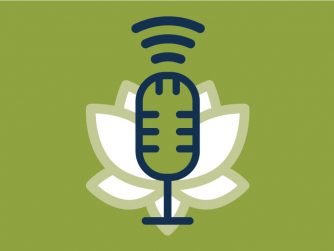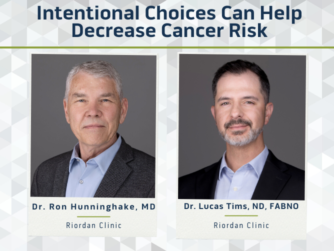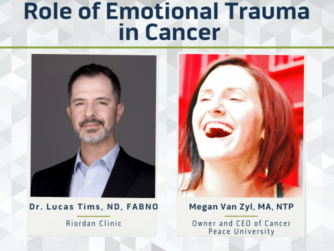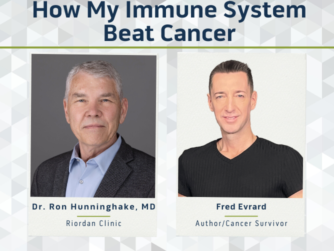Steve Spencer shares his journey of treatment for stage 4 pancreatic cancer at the Riordan Clinic. He arrived after attempts at traditional care that had also left him with kidney problems and MRSA. Unable to walk into his first visit, he completed a 5K this spring.
Thank You To This Episode’s Sponsor
Riordan Clinic Nutrient Store
Episode Transcript
Bonus Episode: Patient Perspective with Steve Spencer
Disclaimer: The information contained on the Real Health Podcast and the resources mentioned are for educational purposes only. They are not intended as and shall not be understood or construed as medical or health advice. The information contained on this podcast is not a substitute for medical or health advice from a professional who is aware of the facts and circumstances of your individual situation. Information provided by hosts and guests on the Real Health Podcast or the use of any products or services mentioned does not create a practitioner-patient relationship between you and any persons affiliated with this podcast.
Intro: This is the Real Health Podcast brought to you by Riordan Clinic. Our mission is to bring you the latest information and top experts in functional and integrative medicine to help you make informed decisions on your path to real health.
Dr. Lucas Tims: Okay. Thanks, everyone, for joining us today for another episode of the Real Health Podcast. I’m your host today, Dr. Lucas Tims. And I’m really excited to welcome our guests today, very special guests today. We have Steve Spencer and his wife Miriam. Steve, we’ve known each other for a couple years now, haven’t we?
Steve Spencer: Yeah, we have. We have, absolutely.
Dr. Lucas Tims: We got to know each other here in my clinic. And we’re going to talk about your story here today, which is a very inspiring story. And I think this’ll be something that a lot of our listeners will be able to connect with, some of them from a cancer diagnosis standpoint, some of them from all the other odds that we overcame. But we’re really excited to dive into this. You shared your story on a number of our outlets already, so a lot of our followers and listeners may already be familiar with your story. Anybody who’s been in to our clinic here has probably come across you at some point and met you. But let’s start at the beginning. So, just to kind of set the table for everybody, Steve is a pancreatic cancer patient that came to me in early 2020, so about two and a half years ago now.
Steve Spencer: Yeah.
Dr. Lucas Tims: And your story with this cancer diagnosis started before you came to me, so I actually want to back up even before then. Take us to around January or February of 2019 and tell us where things started for you then in terms of the diagnosis and what led up to you coming to see me.
Steve Spencer: Late in December, I started feeling bad. Started to get jaundice, having some stomach issues and some energy issues. In January, I started going to the doctor, to my primary care doctor first. And he sent me to the gastroenterologist. I had three different sets of lab work done before they finally said, “Yeah, you’ve got cancer. And it’s pancreatic cancer.” Fortunately for us, at least we thought at that time, the surgeon that we were connected with had an opening less than a week after that, the confirmation of the diagnosis. So, early in February, we had surgery.
Miriam: The Whipple surgery specifically.
Steve Spencer: The Whipple surgery. Right. Right. Except, an hour and a half into it, they had to abort the surgery because I was dehydrated. They weren’t able to keep my blood pressure up. And I was literally touch and go for the next day and a half or so, to the point that they told my family not to leave because they didn’t know whether I was going to survive.
Dr. Lucas Tims: Right. And just to pause you right there, so for those who aren’t familiar, Whipple procedure is a very common surgery they do when there is a mass or a tumor in the pancreas. And they’ll go in. They’ll remove most of the pancreas, but also lots of other organs that connect in and around there. It’s a major procedure.
Steve Spencer: Yeah.
Dr. Lucas Tims: And you said they used the term they aborted that procedure. I think even when I reviewed your records, that they were able to resect part of the tumor but not all of it.
Steve Spencer: They got the gallbladder.
Miriam: And the lymph nodes.
Dr. Lucas Tims: The gallbladder and lymph nodes. I think they did take out some of the disease, so just so everybody’s got all the information. But anyways, they were not able to do the full procedure because of the blood pressure issues. And so they did have to stop the procedure, and there was still active cancer in the body at that point.
Steve Spencer: Yes.
Dr. Lucas Tims: Yeah.
Steve Spencer: So, I stayed in the hospital for three weeks, was released in early April. We started chemo, did chemo for four months, took a two-month break. In between, we got a second opinion at MD Anderson. We got a second opinion at Mayo. And both of those said that I wasn’t a candidate for surgery, which was extremely difficult to hear.
Dr. Lucas Tims: Correct.
Steve Spencer: We went out East to Duke in Raleigh, North Carolina, in Raleigh-Durham area and had a second opinion there. And that surgeon said yes, I’m definitely a candidate. Long story short, we went back out. He performed the surgery. This gentleman, this doctor, the surgeon had done over 1,500 of these procedures. He’d come from New York at Sloan Kettering. So, one thing that I learned going through this process is you want a high-volume surgeon when you need to have surgery.
Dr. Lucas Tims: No doubt.
Steve Spencer: So, he did a great job. He got the cancer out that was in the pancreas. But unfortunately, they found cancer in nine of the 19 lymph nodes that they pulled to test.
Dr. Lucas Tims: Mm-hmm.
Steve Spencer: I went home after a few days of being in the hospital, 10 days later, did my follow-up. Then we drove back to Kansas City and started chemo again. At that point, about the third try with a new chemo cocktail, I was not able to tolerate it.
Dr. Lucas Tims: Yeah. Yeah. You had run into quite a few complications, some of which were directly related to the chemotherapy itself. A very common side effect of one of those chemo drugs you got was that it really hits the kidneys hard, and you were pretty much forced into renal failure and were even on dialysis.
Steve Spencer: Yes. After both surgeries, I had kidney dialysis. The first one, I actually had three or four days of in-room kidney dialysis going 24/7. The second time, it was more of an outpatient basis.
Dr. Lucas Tims: Right.
Steve Spencer: So, as a result of going through kidney dialysis, I also came down with MRSA.
Dr. Lucas Tims: Right.
Steve Spencer: At that point as the MRSA grew, I lost my ability to walk and ended up in a wheelchair.
Dr. Lucas Tims: And just to pause you there for more context for our listeners, MRSA stands for … It’s basically an antibiotic-resistant staph infection, okay? And so these oftentimes do start in ports and tunneled catheters and things like that, which you had because of both the dialysis and the chemotherapy you’d been getting. So, that’s always a risk involved there. But most people when they get a MRSA infection and become septic, meaning it’s in their bloodstream, that doesn’t always turn out great for them. That’s a lot of times what ends up taking a lot of patients, believe it or not, with cancer, is a systemic infection, a sepsis. So, not only did you have that, but you had it of a particular variety of bacteria that was very resistant to a lot of antibiotics. And it had decided to settle into your spine, which left you essentially paralyzed below the waist, right?
Steve Spencer: Correct. Correct.
Dr. Lucas Tims: Okay. So, a lot of things working against you at this point.
Steve Spencer: Yeah. We were fighting the cancer after being told that there’s nothing more that the traditional oncologists could do for us. Come down with MRSA and losing the ability to be mobile and walk. And then we found you.
Dr. Lucas Tims: Yeah. We’ll get to that in a second. But take me through your mindset of when all of that stuff came crashing down on you. Chemo didn’t work. You’ve got advanced-stage pancreatic cancer, the MRSA infection. Can’t really get out of a chair, out of bed. Where’s your mindset at at that part? Can you go back to that and remember where you were?
Steve Spencer: It was a difficult time, honestly. You’d been struggling. Like anybody else, you don’t want to be a burden on your family.
Dr. Lucas Tims: Right.
Steve Spencer: You’d worked all your life to accumulate a financial nest egg. You don’t want to blow it all on a few months of your illness. All those kind of things pass through your mind. But in addition to that, I’ve got four kids, three of which are married. I’ve got six grandkids. We also have the fourth one engaged now at this point and two more grandkids on the way. But I’ve got all these reasons, the whys of life out there, including my wife. We’re going to celebrate our 39th wedding anniversary this weekend. So, I had all these whys to keep fighting, stay alive, and keep going. And together, that’s what we did. Miriam was quite the taskmaster, the encourager to make sure that we stayed on track with the supplements and the eating correctly and consuming the water that we needed and all the right protein and that sort of thing.
Dr. Lucas Tims: Yeah. She was cracking the whip on you, is what you’re saying?
Steve Spencer: Absolutely.
Dr. Lucas Tims: Yeah. No, I love that in terms of the way you put it as far as you … Even though everything was working against you, you still had that why. And you had those things you were looking forward to in terms of kids getting married and grandkids and celebrating anniversaries. And so I think that’s an important piece of the journey, is to always remember that you have to have a why in these types of situations. And so, Miriam, this is where I want to bring you in, because I feel like that first meeting when you guys came in, I kind of felt like you were dragging Steve in to see me. Was that true?
Miriam: Yes. This is the way life has gone with our partnership. So, I had done a lot of research. I had gathered the information. He came along for the ride. And we walked into your office, and you were very honest with us about what you could and couldn’t do.
Dr. Lucas Tims: Right.
Miriam: We felt like forming this relationship and following your guidelines was going to benefit Steve in his whatever life he had left, but it was also going to change our family practices and spread through the generations. One thing I want to add is COVID was very active in all this, also. And so being able to physically be with those whys, our children, our grandchildren, was not possible at various time periods. And so that was another challenge for us, was to keep that communication open with our kids and our grandkids as we went through and walked this journey.
Advertisement: There’s a lot more to this conversation, and it’s coming up right after a quick break. Today’s podcast is brought to you by LivOn Labs, makers of liposomal vitamins and supplements. LivOn uses a liposomal encapsulation technology to protect nutrients from destruction in the digestive system. This allows for more efficient delivery of essential vitamins and nutrients. Choose from various supplements that support health and well-being, such as Lypo-Spheric Vitamin C, magnesium, glutathione, and more. To learn more, visit LivOn Labs, that’s L-I-V-O-N, Labs.com.
Dr. Lucas Tims: Yeah. It’s amazing to think back. And with all the other things working against us – oh, by the way, a pandemic was just geting started. So, yeah. Even now when I reflect on it, we had a lot of challenges to overcome. And so I think I can recall that first meeting that we had. And like you said, I think we just kind of had a frank discussion. I was like, “Well, I mean, you got a lot of things working against you. I’m not sure how much I can help you, but we’re willing to try. Let’s take it one day at a time. Let’s just start somewhere and see how far we can get.” And like you said, there was always that greater idea of what can we learn from this? Even if we’re in too bad of a situation where we can’t make headway with Steve, how can the whole family learn from all this? Right? And so we always had that as kind of like a parallel thing we were thinking about, too.
Dr. Lucas Tims: But obviously, the story doesn’t end there. This was, again, I remind people, two and a half years ago. And when you look at population statistics for advanced-stage pancreatic cancer, the five-year survival is somewhere in that 1 to 2% range. So, we’re not talking about a very common thing. Even two and a half years later, you don’t see a lot of people, especially going down the road that we went, which did not really involve any traditional treatments. Because again, to remind our listeners, you had tried that. And that didn’t work, and your body couldn’t handle that stuff.
Steve Spencer: Yep.
Dr. Lucas Tims: So, you came to us. We do our normal initial approach where we take some testing, do some lab work, try to figure out in each person what’s going on in the terrain of their body or the soil of their body. We like to use those terms a lot because we look at cancer as basically a sign or a signal that there’s something deeper going on in the body, right? It actually is trying to tell us there’s a problem, and so we want to ultimately get to that root issue. So for you, through that testing, we identified a number of things that we needed to get to work on. Obviously, we had this infection working against us. But there was a lot of high inflammation markers. And so we used a lot of our tools that we use with a lot of our cancer patients, like IV vitamin C, mistletoe, ozone therapy. I would say that it was probably a good four to six months before we saw significant improvement.
Steve Spencer: Correct.
Dr. Lucas Tims: Would you agree with that?
Steve Spencer: Yep.
Dr. Lucas Tims: One of the initial signs of improvement was that, maybe not directly related to the cancer, but that you started to get some feeling back in your lower limbs. Right?
Steve Spencer: Correct. Correct.
Dr. Lucas Tims: Yeah.
Steve Spencer: During that timeframe, we had a social worker that was coming into the house. Again, I was wheelchair-bound, and so we had some help. We actually had hospice services coming into the house. But one of the social workers that came in to help bathe me noticed that every time she would get to my feet, my feet would jump. So, we started having some feeling in the feet. Her recommendation was, “Let’s get him off of hospice. Go get a second opinion,” which we did. And we’re thankful we did. I’ve called that social worker a couple different times just to thank her and send her videos as we’ve progressed from the wheelchair to the walker to walking with a couple canes, to now without any need for assistance to walk.
Dr. Lucas Tims: Yeah. I think that highlights the fact that this journey and your success has really been … It’s been from a team.
Steve Spencer: Correct.
Dr. Lucas Tims: We’ve had a whole team and cast of characters that have helped us along the way. And you and I obviously, our relationship started two and a half years ago, roughly. But we’ve had several other people that have been part of the process of you healing.
Steve Spencer: Correct. Correct.
Dr. Lucas Tims: Social workers, physical therapists, infectious disease doctors.
Steve Spencer: Spinal cord doctor.
Dr. Lucas Tims:
Spinal cord doctors. Yeah.
Steve Spencer: Yeah. Occupational therapists and physical therapists. Both of those have helped me get better and progress along the way.
Dr. Lucas Tims: Yeah. Yeah. That team approach is very important to point out, because I do think when we have these really complex cases, the more different individuals and practitioners you can get in the mix to help them, the better. And the broader your team and the more inputs you have and ideas, usually you’re going to find answers and solutions if you keep looking in different places. So, we’ll fast-forward a little bit. And again, people can read about your whole story in a lot of other forums that we have, our website, our newsletter. But fast-forward to, I believe, maybe about four to six months ago now. We had some scans done, right?
Steve Spencer: We did. We did.
Dr. Lucas Tims: Why don’t you share with our audience what the scans showed?
Steve Spencer: Well, we had a CT scan done, and we hadn’t had that done for a couple years. You had wanted that done. And my primary care physician said, “Well, let’s make sure we don’t mess up your disposition,” because I was pretty optimistic, pretty positive. But we had that done, and the scan showed no sign of cancer. No sign of cancer in the pancreas area. Nothing in the lymph nodes. Nothing in my hip bones.
Dr. Lucas Tims: Or the liver or any of the bones. All those other areas that there had been issues with. So, a clean bill of health, so to speak.
Steve Spencer: Yeah.
Dr. Lucas Tims: Yeah.
Steve Spencer: Yeah. It was pretty exciting.
Dr. Lucas Tims: Yeah. That was an exciting day. And I can remember the day when we had you there in clinic that day and going through that. Even though we knew because we had seen your whole progress, I mean, we knew that you were doing well. We had been tracking labs and other things that told us that we were moving that direction. But there’s something about seeing those images on the scan kind of being that seal of, “Yes. We are all clear, and there’s no evidence of disease. And essentially, a miracle has happened here.”
Steve Spencer: Yeah. It was a good confirmation, like you said, of the work that we’d done and the lab results that we’d gotten back from a quarter-to-quarter basis.
Dr. Lucas Tims: Yeah.
Steve Spencer: Like I said, it was just a really good confirmation that the journey that we’d been on together has worked.
Dr. Lucas Tims: So far, so good.
Steve Spencer: Right.
Dr. Lucas Tims: Yeah.
Steve Spencer: Absolutely.
Dr. Lucas Tims: But obviously, we’re still working on stuff. And I think it’s important for people to know that we still do some maintenance-type treatments with you, even though we’ve gotten to that point of no evidence of disease.
Steve Spencer: Correct. Yeah.
Dr. Lucas Tims: So, it’s an ongoing journey.
Steve Spencer: Correct.
Dr. Lucas Tims: Once we have things where we need them, then there oftentimes is some work required to keep them there. And so you’ve made a lot of adjustments with your diet, lifestyle, exercise, mental, emotional health. Of course, we still do some periodic IV treatments and things like that to help with the immune function and keep inflammation levels down. But maybe if you can, just wrap us up here by what’s the main message that you want people to feel from hearing your story?
Steve Spencer: I feel like I’m still here. God’s kept me here to provide hope for others. And anybody that’s watching this podcast, I hope that you will find that there’s hope. Even though traditional medicine may not feel like you’re a candidate for that hope, for that help, that a holistic approach can be very helpful for you. And there’s many other tools outside of that traditional toolbox for doctors like Dr. Tims here to use to help you, regardless of what kind of cancer you have, to try to get better. Hopefully, you all will have the hope that I had. We just have kept things positive. I told Miriam all along, I said, “Why can’t I be part of that?” And I called it the 6 or 7%, and you reminded me that it was a lot lower than that. But why can’t I be that lower number?
Dr. Lucas Tims: Yeah.
Steve Spencer: And all along, we’ve just tried to reach out to others as we’ve heard of their diagnosis and be encouragers to them and share some of the things that we’ve learned to do and not to do over the last few years since the diagnosis.
Dr. Lucas Tims: Yeah. That’s a beautiful message. I love talking about hope. I tell people all the time that hope can be one of the best drugs for people in terms of its ability to incite healing. I know you guys have always put a lot of work into the faith side of things, as well, and stayed very strong there. You’ve helped so many people. I know you’ve become somewhat of a greeter in our clinic, helping people get comfortable when they’re first new here. And so we appreciate that so much. And just, thank you for being a beacon of hope for so many people, for us, as well, even for myself. You’ve taught me that sometimes, the impossible is possible and that miracles can happen and to always have hope. So, we want all of our listeners, anybody who listens to this podcast or comes across your story to feel that, as well. Steve, Miriam, thank you guys so much for everything, but thank you for being with me today. And we’ll talk to you again soon, okay?
Steve Spencer: Absolutely. Thank you.
Miriam: Thank you.
Outro: Thank you for listening to the Real Health Podcast. If you enjoyed this episode, be sure to subscribe and leave us a review. You can also find all of the episodes and show notes over at RealHealthPodcast.org. Also, be sure to visit RiordanClinic.org, where you will find hundreds of videos and articles to help you create your own version of real health.





